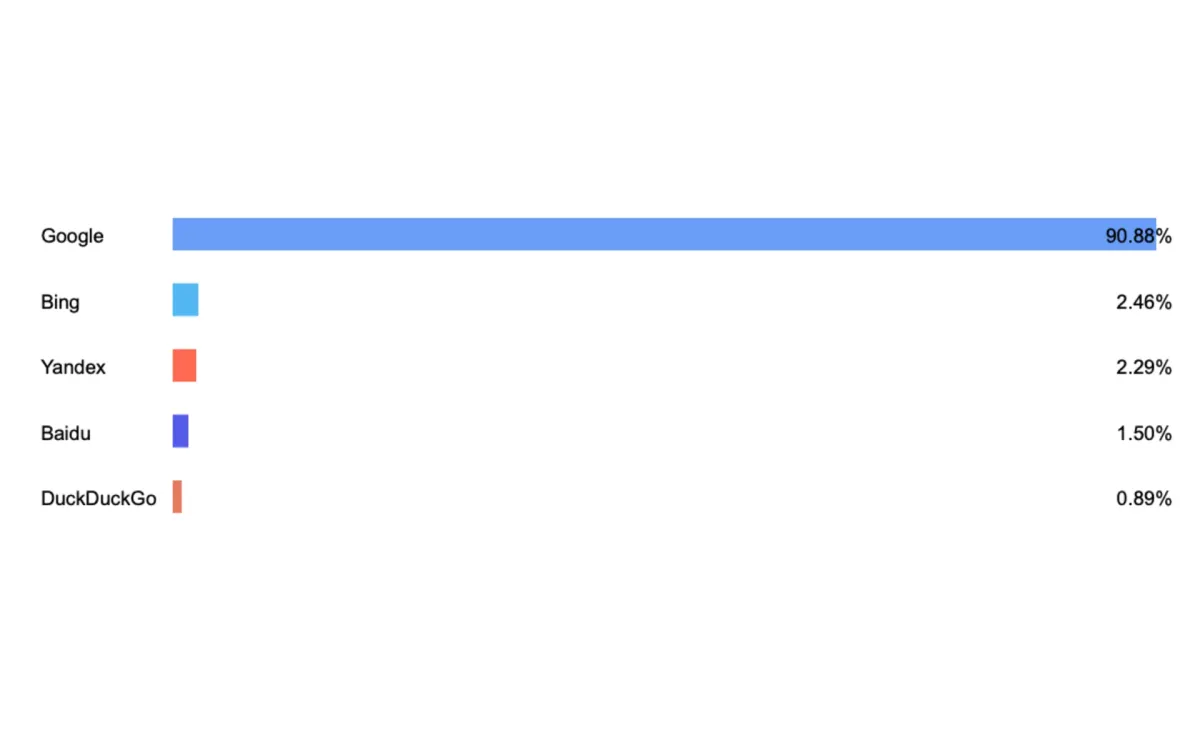
In a quarterly search engine market share report released on January 21, 2025, Cloudflare's Data Insights Team revealed that Google maintained its dominant position in the global search market during Q4 2024, capturing 90.88% of all search engine referrals.
The comprehensive analysis, based on data from Cloudflare's network spanning more than 200 cities across 100 countries, indicated that Bing secured the second position with 2.455% market share, followed closely by Yandex at 2.288%. When excluding Google from the calculations, these percentages increased to 26.915% and 25.084% respectively.
According to Cloudflare, which serves approximately 25 million Internet properties including 17% of the Fortune 1000 companies, the data sample provided statistically relevant insights into global search engine usage patterns. The methodology employed relied on analyzing referer headers from HTTP/S requests across their reverse proxy network, which handles more than 10% of all websites.
A significant technical finding emerged on October 3, 2024, when Cloudflare detected a 7% increase in traffic from Chrome users with Google referrer headers compared to the previous week. This change primarily affected Android, Windows, and MacOS X operating systems, attributed to Google's prefetching mechanism designed to reduce page load times.
Regional analysis revealed varying patterns of search engine adoption. In Australia, Google's market dominance proved even more pronounced, commanding 94.567% of the search market. Bing maintained its second position in the Australian market with 3.078%, while DuckDuckGo secured third place with 1.344% market share.
The mobile search landscape demonstrated distinct characteristics, particularly on Android devices. Google's share on Android reached 93.188%, with Yandex achieving 2.537% and Baidu securing 2.083%. In Australia's Android ecosystem, Google's dominance increased further to 97.541%, with DuckDuckGo and Bing following at 1.379% and 0.380% respectively.
Cloudflare's methodology accounted for several technical considerations in data collection. The analysis excluded bot traffic, sub-resource requests such as JavaScript and fonts, and implemented specific operating system categorizations. The report encompassed major platforms including iOS, Android, Desktop systems (Windows, MacOS X, Linux, ChromeOS), and various mobile platforms ranging from WebOS to gaming consoles.
The data collection process faced certain technical limitations. The methodology assumed consistent link-clicking behavior across search engines and relied on intact referer headers, which users could potentially disable. Additionally, Chrome's NoState Prefetch mechanism presented a challenge in accurately measuring user behavior, as it counted prefetched results regardless of actual user clicks.
Smaller search engines maintained modest but measurable market shares. DuckDuckGo achieved 0.892% global market share, while privacy-focused alternatives like Brave Search and Startpage registered 0.279% and 0.003% respectively. Regional search engines such as Naver, Yahoo Japan, and Baidu demonstrated stronger performances in their primary markets.
The findings highlighted the technical complexities of measuring search engine market share in an interconnected digital landscape, where browser technologies, user privacy settings, and regional preferences intersect with global search patterns. Cloudflare's position as a major internet infrastructure provider offered unique insights into these dynamics, though the company acknowledged specific methodological assumptions and limitations in their analysis.

